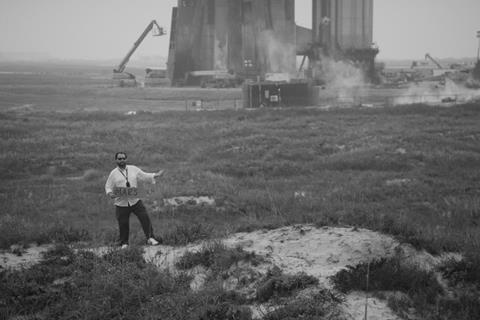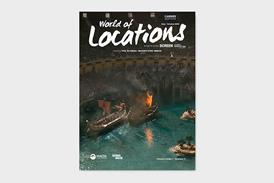Boca Chica, Texas lives with the thrills and unquantifiable spills of the space race

Dir/scr: Julien Elie. Canada. 2024. 100mins
Focused around Elon Musk’s SpaceX Starbase In Boca Chica, Texas, Julien Elie’s intelligent, multifaceted documentary Shifting Baselines constructs a vivid mosaic of the romance and the hazards of space exploration. The thought-provoking material and luminous black and white cinematography create an enthralling documentary that is certain to travel, and may attraction theatrical interest.
A vivid mosaic of the romance and the hazards of space exploration
Canadian filmmaker Elie remains best known for his documentary Dark Suns (2018), an epic investigation of cartel murders in Mexico. In a very different way, Shifting Baselines could also be considered a film about crimes against humanity. He begins with Professor Daniel Pauly fishing off the coast of Belize and lamenting the declining stocks and shrinking fish sizes compared to the ready bounty of the past. Elie then cuts to Boca Chica, where vast structures loom out of the mist. Majestic 50-storey launch pads and rockets dominate the skyline in images that might have been plucked from the imagination of a Fritz Lang or a Bond movie production designer.
The early stages of the film generate an air of optimism, as those who live near the base or come to visit share their enthusiasm for a vast industrial site that is labelled ‘The Gateway To Mars’. Tourists arrive by the bus load. Crowds gather to watch launches from the nearby beaches or search for debris when things do not go according to plan. The people interviewed by Elie are amateurs and enthusiasts, and never official representatives from the Musk team. Everyone is excited to be present at this bold new frontier of human endeavour. A tour guide advises that “there are no failures here, just lessons”. One man regards his prime viewing site as the equivalent of watching the construction of the Pina, Nina and Santa Maria ships prior to Columbus setting sail. There is no trace of irony in his remarks.
One of the most appealing aspects of the documentary is the striking black and white cinematography of Glauco Bermudez and Francois Messier-Rheault which captures ashen beaches, snowy landscapes and a feeling of Boca Chica as something otherworldly. Elie’s priority is always the human perspective on the sweeping changes around Boca Chica, where beaches are deserted and houses exist to service the needs of what has become a company village (with shades of Wes Anderson’s Asteroid City). He gradually expands the focus to look at the space race through more critical, concerned eyes. Many of these interviewed are never identified, but one person remarks that few of the ordinary citizens of Boca Chica or nearby Mexico are ever likely to afford a ticket for space travel.
In Cambridge, Massachusetts, Jonathan McDowell has spent a lifetime collecting information on rocket launches and satellites. We learn of the thousands of satellites orbitingthe earth and the growing worries about man-made changes to the night skies. Could there come a time when we can’t see the stars in the sky? Space exploration is relatively unregulated, giving humanity the leeway to create as much damage in space as it has on Earth. “Why do we think it would go any better on Mars?” asks one astronomer.
Elie returns to Daniel Pauly before the end of the film as he explains his theories of shifting baselines and inter-generational amnesia where nobody remembers the way things were or what has been lost along the way. Shifting Baselines shows us examples of habitat loss, declining wildlife populations, light pollution and at least asks us to question whether anyone really understands the consequences of the current investment in satellite technology and the race to colonise new worlds.
Production companies: GreenGround Productions, cinema belmopan
International sales: Filmotor, michaela@filmotor.com
Producers: Andreas Mendritzki, Aonan Yang, Julien Elie
Cinematography: Glauco Bermudez, Francois Messier-Rheault
Editing: Xi Feng
Music: Mimi Allard























